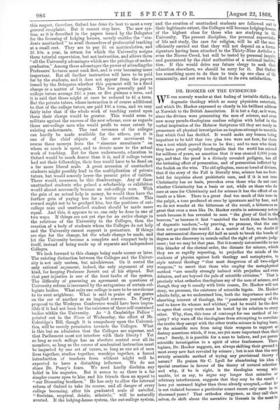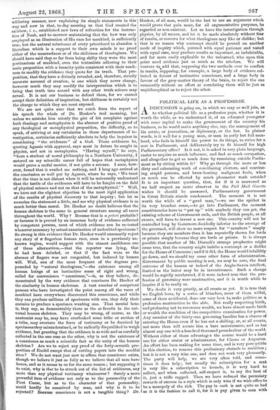DR. HOOKER ON THE EVIDENCES.
WE can scarcely wonder at that feeling of irritable dislike for dogmatic theology which so many physicists entertain, and which Dr. Hooker expressed so clearly in his brilliant address at Norwich to the British Association. It is but a day, as it were, since the divines were persecuting the men of science, and even now many pseudo-theologians confuse religion with belief in the verbal inspiration of the Hebrew Scriptures till they are ready to pronounce all physical investigation an impious attempt to unsettle that which God has decided. It would make any human being impatient to be told that two plus two were not four, for there was a text which proved them to be five ; and to men who think they have proof equally irrefragable that the world has existed for millions of years, an assertion that it was created 6,000 years ago, and that the proof is a divinely revealed pedigree, has all the irritating effect of persecution, and of persecution inflicted by the foolish on the wise. The old syllogism, once so loved of divines, that if the story of the Fall is literally true, science has no foot- hold for inquiries about prehistoric man, and if it is not true Christianity has no basis, provokes even those who do not care whether Christianity has a basis or not, while on those who do care at once for Christianity and for science it has the effect of an insult or a blow. There is a great deal too much of this tone in the pulpit, a tone produced at once by ignorance and by fear, and we do not wonder at the bitterness of the recoil, a bitterness so great that even a man like Dr. Hooker exults in astronomy not so much because it has revealed to man "the glory of God in the heavens," as because it first "snatched the torch from the hands of dogmatic teachers,"—by proving, we presume, that the sun does not go round the world. As a matter of fact, we doubt if that astronomical discovery did half as much to break the bonds of dogma as the discovery in morals called the right of private judg- ment; but we may let that pass. But it is surely not scientific to use this blunder of the clerical order, the distaste for science, which they are so rapidly repenting, to prejudice the minds of the students of physics against both theology and metaphysics, to style natural theology "that most dangerous of all two-edged weapons," to assert that those who employ the metaphysical method "are usually strongly imbued with prejudice and even delusion, and are beyond the pale of scientific criticism." That is precisely what orthodox theologians say of the men of science, and though they say it usually with little reason, Dr. Hooker will not deny, we presume, the existence of scientific bigots. Dr. Hooker admits fully, as we understand him, both the importance and the absorbing interest of theology, the "passionate yearning of the soul to know its whence and whither," and he would be the first to agree that every truth must be tested by its relation to every other. Why, then, this tone of contempt for one method of in- quiry? why warn off the theologians from attempting to correlate the truths they accept with the other truths science is laying bare, or the scientific men from using their weapons to support or destroy assertions which, if true, are yet more important than theu own? Surely, it is possible for a man to believe, and yet pursue scientific investigation in a spirit of utter fearlessness. Theo- logians, Dr. Hooker suggests, are always shifting their ground tu meet every new fact revealed by science ; but is not that the ma4 strictly scientific method of trying any provisional theory d nature? He praises Sir C. Lyell for abandoning his idea special creations in favour of the theory of natural selection. and why, if he is right, is the theologian wrong who. unable, let us say, to argue any longer that miracles arc arbitrary interferences, suggests that they may be the result a laws yet untraced higher than those already accepted,—that las is not violated because a particular comet recurs only once in ter thousand years? That orthodox clergymen, as they call them selves, do shift about the narrative in Genesis in the most be wildering manner, now explaining its simple statements in this way and now in that, to-day assuring us that God created the rainbow, 1. e., established new laws of refraction for the instruc- tion of Noah, and to-morrow maintaining that the bow was only employed as an illustration of His care for mankind, is sufficiently true, but the natural reluctance of every priesthood to abandon a literalism which is a support to their own minds is no proof either of the unsoundness or of the shiftiness of theologians. We should have said that so far from being shifty they were the most pertinacious of mankind, even the textualists adhering to their main proposition with a tenacity quite consistent with their readi- ness to modify the evidence they quote for its truth. That pro- position, that they have a divinely revealed, and, therefore, strictly accurate account of creation, is one which they never change, however much they may modify the interpretation which is to bring that truth into accord with any other truth science may reveal. It is not our business to defend them, for we cannot accept their definition of inspiration, but shiftiness is certainly not the charge to which they are most exposed.
We are not quite sure that we catch from the report of is speech the whole of Dr. Hooker's real meaning, but unless we mistake him utterly the gist of his complaint against both theology and metaphysics is the absence of positive proof of any theological or metaphysical proposition, the difficulty, so to speak, of arriving at any certainties in those departments of in- vestigation, certainties sufficiently absolute to help the inquirer in -considering "the evidences" of a God. Those evidences he, quoting Agassiz with approval, says must in future be sought in physics, and not in metaphysics. "Having myself," he says, "been a student of moral philosophy in a Northern University, I entered on my scientific career full of hopes that metaphysics -would prove a useful mentor, if not quite a science. I soon, how- ever, found that it availed me nothing, and I long ago arrived at the conclusion so well put by Agassiz, where he says, We trust that the time is not distant when it will be universally understood that the battle of the evidences will have to be fought on the field of physical science and not on that of the metaphysical.'" Well, we have not the slightest objection to the most rigid application of the results of physical discovery to that inquiry ; but let us -examine the statement a little, and see why physical evidence is so much better than moral. Dr. Hooker no doubt believes that the human skeleton is the same in general structure among all races throughout the world. Why ? Because that is a priori probable? or because it is proved by an immense body of evidence collected by competent persons, most of which evidence can be re-tested whenever necessary by actual examination of undoubted specimens? So strong is this evidence that Dr. Hooker would summarily reject any story of rr fingerless human race, even in a previously un- known region, would suggest with the utmost confidence one of three alternatives,—that the reporter was lying, that he had been deluded, or that if the fact were so the -absence of fingers was not congenital, but induced by human will. Well, one of the most frequent of the dogmas pro- pounded by "natural- theologians,"—the existence among all human beings of an instinctive sense of right and wrong, -called for convenience "conscience,"—is, as they believe, de- monstrated by the very evidence that convinces Dr. Hooker of the similarity in human skeletons. A vast number of competent persons who have investigated the point among all the races of mankind have everywhere discovered this conscience, and while they can produce millions of specimens with one, they defy their -enemies to produce a specimen wanting one. That mental bone is, they say, as demonstrably there as the os frontis in the uni- Tersal human skeleton. They may be wrong, of course, as the anatomist may be, may have overlooked some tribe or section of a tribe, may overrate the force of testimony or be deceived by specimens they misunderstand, or be radically disqualified to weigh evidence, but granting that the evidence is as wide and as carefully collected in the one case as the other, why is not the existence of a conscience as much a scientific fact as the unity of the human skeleton ? Are we to reject any proof of the forty-seventh pro- position of Euclid except that of cutting papers into the needful sizes? We do not want just now to affirm that conscience exists, though we believe it just as fully as we believe that all men have bones, and as it seems to us for the same reason ; but supposing it to exist, why is that to be struck out of the list of evidences, any more than any physical testimony whatsoever? Surely a more powerful item of evidence not only as to the personality of the First Cause, but as to the character of that personality, could hardly be conceived by man, and why is it to be rejected'? Because conscience is not a tangible thing? Dr. Hooker, of all men, would be the last to use an argument which would prove that pain must, for all argumentative purposes, be regarded as non-existent. Let us have the investigation through physics, by all means, and let it be made absolutely without fear of results, or concern for what theologians may like or dislike; but that is no reason why contempt should be poured on another mode of inquiry which, pursued with equal patience and tested with equal care, may produce results as important, as indubitable, and far more easily explicable to the unlearned, who upon this point need evidence just as much as the scholars. We will venture to add that, supposing the two methods ever to conflict in results, supposing, for example, a large body of evidence col- lected in favour of instinctive conscience, and a large body in favour of the grey-matter theory of the brain, to reject the one summarily without an effort at correlating them will be just as unphilosophical as to reject the other.































 Previous page
Previous page